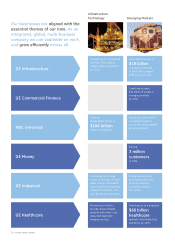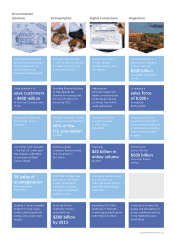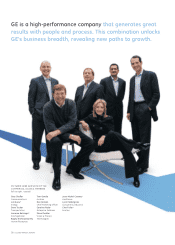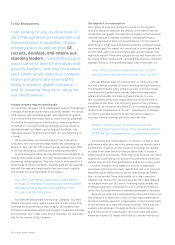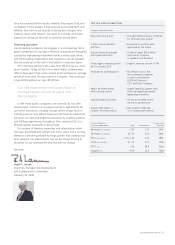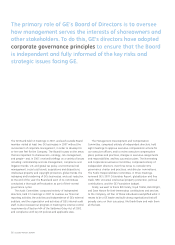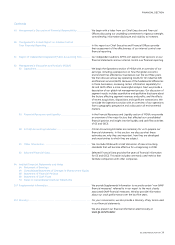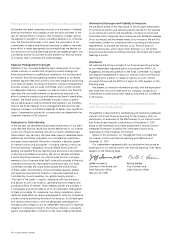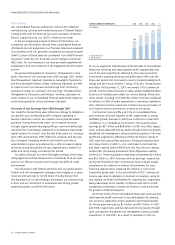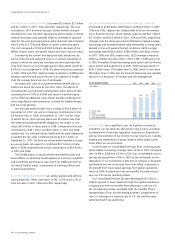GE 2007 Annual Report Download - page 36
Download and view the complete annual report
Please find page 36 of the 2007 GE annual report below. You can navigate through the pages in the report by either clicking on the pages listed below, or by using the keyword search tool below to find specific information within the annual report.
34 ge 2007 annual report
To Our Shareowners:
I am writing to you as chairman of
GE’s Management Development and
Compensation Committee, whose
primary job is to ensure that GE
recruits, develops, and retains out-
standing leaders. I would like to give
you a sense of how GE develops and
pays its leaders, and why we believe
well-constructed executive compen-
sation programs are essential to
being a premier global company —
and to creating long-term value for
our shareowners.
A great company requires great people
For more than 100 years, GE has developed a system of disciplined
oversight that has produced many successful leaders. We recruit
hard-working, self-motivated people, and support their growth
in an environment that allows them to reach their full potentials.
We do this by operating as a meritocracy, making signifi cant
investment in training, providing challenging assignments to
develop breadth and depth, giving frequent feedback, and
rigorously measuring performance from the very beginning of
a career.
More importantly, we invest the time of our most-senior
executives, who have primary responsibility for cultivating our
people. In fact, our CEO Jeff Immelt typically spends about 30%
of his time developing, coaching, and evaluating executives.
As executives grow within GE, they become more valuable to us:
they become better leaders, they gain broad experiences across
businesses and geographies, they learn how to drive results in a
broad range of market conditions, and they build domain expertise
and skill. Perhaps most importantly, they learn how to identify
and develop the next generation of GE leaders.
Our 189 most-senior executives have spent
at least 12 months in training and professional
development programs during their fi rst
15 years at the Company.
You want the best people running your Company. You want
leaders with great vision, global experience, and an unrelenting
commitment to performance with integrity. GE’s leaders have
thrived in a demanding culture and in highly competitive business
environments. They create value for the Company, for customers,
and for the owners of the Company.
Our approach to compensation
GE’s culture of long-term performance and our strong track
record of executive retention are directly connected to how we
compensate our people. Our approach is aligned with shareowner
interests because it rewards consistent, strong performance.
Being paid well at GE is not an entitlement — it’s the result of
performing at a high level and delivering reliable, sustained results
over many years. We expect our executives to build careers here,
to work hard, and to grow their businesses and themselves over
multi-year periods. Those who succeed can do well fi nancially over
the course of their careers at GE — provided they meet our ambitious
strategic, fi nancial, and operational goals, year in and year out.
Over 70% of total compensation for our fi ve
most-senior executives last year was “at risk.”
We use different types of compensation to create an overall
mix that balances rewards for recent and long-term performance.
The program includes salary and annual cash incentives, longer-
term equity and performance awards, deferred compensation,
and pension benefi ts. We balance these elements in a way
that recognizes executives’ responsibilities and their abilities to
contribute to the short- and long-term growth of the Company.
Importantly, as executives rise within GE, an increasing percentage
of their total compensation is “at risk” — meaning it is contingent
on reaching targets based on things like solid increases in
revenues, returns, earnings per share, and cash fl ow.
Twenty-seven of our chief executives are
running businesses today that would qualify as
FORTUNE 500 companies on a stand-alone basis.
Annual incentive compensation — or “bonus” — is tied to clear
performance objectives and is the primary way we reward current
performance. However, we don’t want to encourage our people
to chase short-term trends or take excessive risks to create a
single period of good results. That’s why these bonuses are linked
to previous years, taking into account not just what an executive
did this year, but also their performance and bonus in prior years.
Another example of this balance is that we compensate
executives with long-term equity awards that vest over time and
therefore require performance over an extended period before
they can be earned. These tools enable us to align executive
interests with shareowner interests because their value depends
on the performance of GE’s stock. In making equity awards, we
emphasize long-term contributions to GE’s overall performance
rather than focusing narrowly on individual businesses or functions.
Because our objective is sustained long-term performance, we
don’t believe it is either wise or fair to follow rigid mathematical
formulas in setting executive compensation. In fact, looking solely
at the numbers can create the wrong incentives. That’s why we
evaluate a broad range of subjective factors in determining
appropriate levels of compensation. This committee personally
knows each senior GE leader, which lets us consider how execu-


